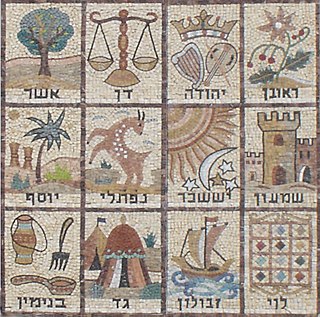See also
- Ashers, locality in New Zealand
Asher is a character in the Book of Genesis.
Asher may also refer to:

According to the Hebrew Bible, the Kingdom of Israel was one of two successor states to the former United Kingdom of Israel and Judah. Historians often refer to the Kingdom of Israel as the "Northern Kingdom" or as the "Kingdom of Samaria" to differentiate it from the Southern Kingdom of Judah and the united monarchy.

The Israelites were a confederation of Iron Age Semitic-speaking tribes of the ancient Near East, who inhabited a part of Canaan during the tribal and monarchic periods.

According to the Hebrew Bible, the Tribe of Zebulun was one of the twelve tribes of Israel.

Asher, in the Book of Genesis, is the second son of Jacob and Zilpah, and the founder of the Tribe of Asher.

According to the Bible, the Tribe of Gad was one of the Twelve Tribes of Israel who, after the Exodus from Egypt, settled on the eastern side of the Jordan River. It is one of the ten lost tribes.

According to the Hebrew Bible, the Tribe of Asher was one of the Tribes of Israel descended from Asher, the eighth son of Jacob. It is one of the ten lost tribes.
The Twelve Tribes of Israel are, according to Judeo-Christian texts, the descendants of the Biblical patriarch Jacob, also known as Israel, through his twelve sons by various women, who collectively form the Israelite nation. Within ancient Judaism, one's tribal affiliation had a great impact on his or her practices and opportunities, as some tribes enjoyed privileges others did not and some tribes received more blessings than others. Some modern scholars dispute whether there ever were (exactly) twelve Israelite tribes, and think that the number 12 more likely signifies a symbolic invented tradition as part of a national founding myth.
144,000 is a natural number. It has significance in various religious movements and ancient prophetic belief systems.

The ten lost tribes were the ten of the Twelve Tribes of Israel that were said to have been exiled from the Kingdom of Israel after its conquest by the Neo-Assyrian Empire circa 722 BCE. These are the tribes of Reuben, Simeon, Dan, Naphtali, Gad, Asher, Issachar, Zebulun, Manasseh, and Ephraim; all but Judah and Benjamin. The Jewish historian Josephus wrote that "there are but two tribes in Asia and Europe subject to the Romans, while the ten tribes are beyond Euphrates till now, and are an immense multitude, and not to be estimated by numbers".
Asher is an English and Germanic occupational surname for an ash maker, derived from the Middle English surname "Aschere" or from German " Äscher"(Ashman). It could also be a form of the Old English surname "Æsċer"(Æsċe +ere), meaning someone who lived by an ash tree or ash grove, suffix denoting an inhabitant. It is also a common Jewish and Christian first name, as well as a Jewish surname, and is the name of Asher the son of Israel in the Old Testament—therefore unrelated to the Old English or Germanic occupational root. Jacob described Asher as a “most blessed son”, saying that the land of Asher would have rich food and delicacies fit for kings. Moses also gave a blessing to each of the twelve tribes. Moses' blessing said that Asher would be blessed with sons, pleasing to his brothers, and have his foot immersed in oil.

The Mateh Asher Regional Council is a regional council in the western Galilee of northern Israel. It is named after the Tribe of Asher which had been allotted the region in antiquity according to the Book of Joshua (19:24–31). It was founded in 1982 as a merger of three regional councils: Ga'aton, Na'aman and Sulam Tzor. The council's offices are located on Highway 4, between Regba and Lohamei HaGeta'ot.

Shomrat is a kibbutz in northern Israel. Located in the western Galilee on the coastal highway just north of Acre, it falls under the jurisdiction of Mateh Asher Regional Council. In 2019 it had a population of 580.
Afek is a Hebrew word that can refer to a number of places in the biblical Land of Israel.
The primary traditional Ekoi deities are Obassi Osaw, the sky god, and Obassi Nsi, the earth god, similar to the Efik. Ancestors and natural forces are also emphasized in Ekoi worship. Various Ekoi cults are devoted to the welfare of common activities, such as farming. Before the establishment of British colonial administration, the egbo was a prominent Ekoi secret society that had strong social regulatory functions as well as influence in religious matters. Members of the egbo used a form of ideographic writing called nsibidi, variations of which were formerly found among other ethnic groups in southeastern Nigeria.

Evron is a kibbutz in northern Israel. Situated in the western Galilee adjacent to Nahariya on the city's southeast border, it falls under the jurisdiction of Mateh Asher Regional Council. In 2019 it had a population of 847.
Dan or DAN may refer to:

The Assyrian captivity is the period in the history of ancient Israel and Judah during which several thousand Israelites from the Kingdom of Israel were forcibly relocated by the Neo-Assyrian Empire. This is one of the many instances of the resettlement policy of the Neo-Assyrian Empire. The Kingdom of Israel was conquered by the Neo-Assyrian monarchs Tiglath-Pileser III and Shalmaneser V. The later Assyrian rulers Sargon II and his son and successor, Sennacherib, were responsible for finishing the twenty-year demise of Israel's northern ten-tribe kingdom, although they did not overtake the Kingdom of Judah. Jerusalem was besieged, but not taken. The tribes forcibly resettled by Assyria later became known as the Ten Lost Tribes.

The Norman and Helen Asher Space Research Institute (ASRI) is a specialized institute dedicated to multidisciplinary scientific research at Technion - Israel Institute of Technology, in Haifa, Israel.
Lev is the surname of: